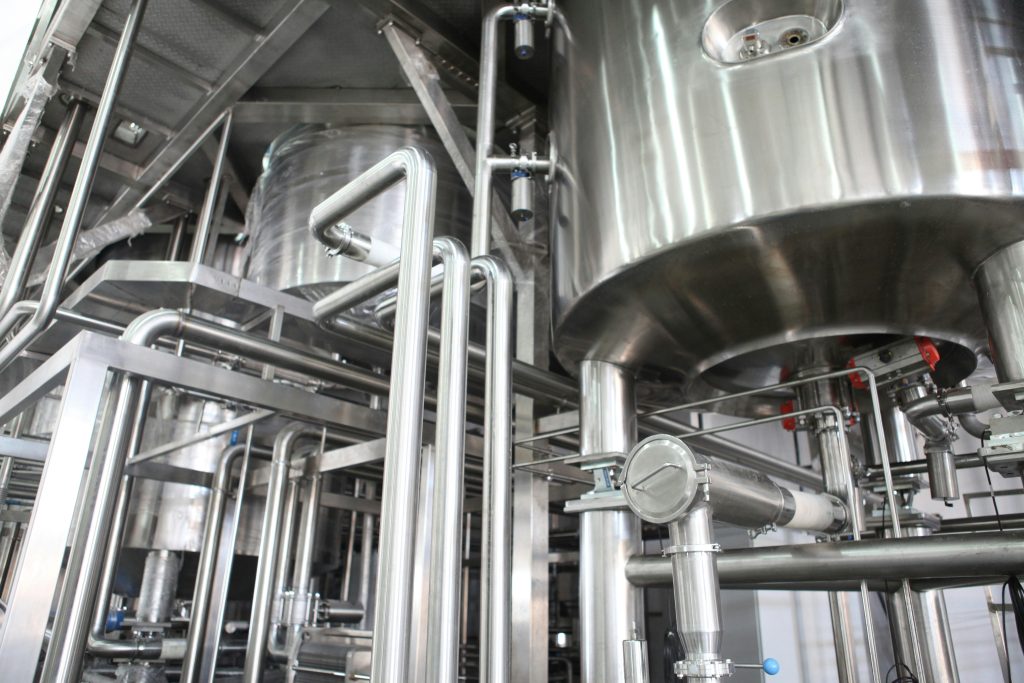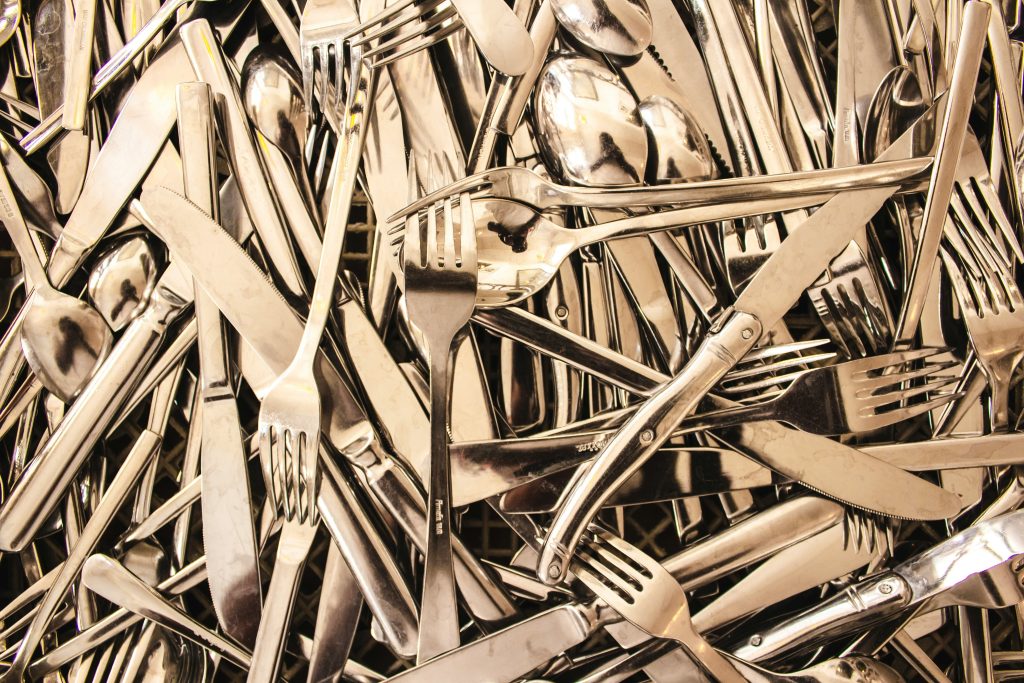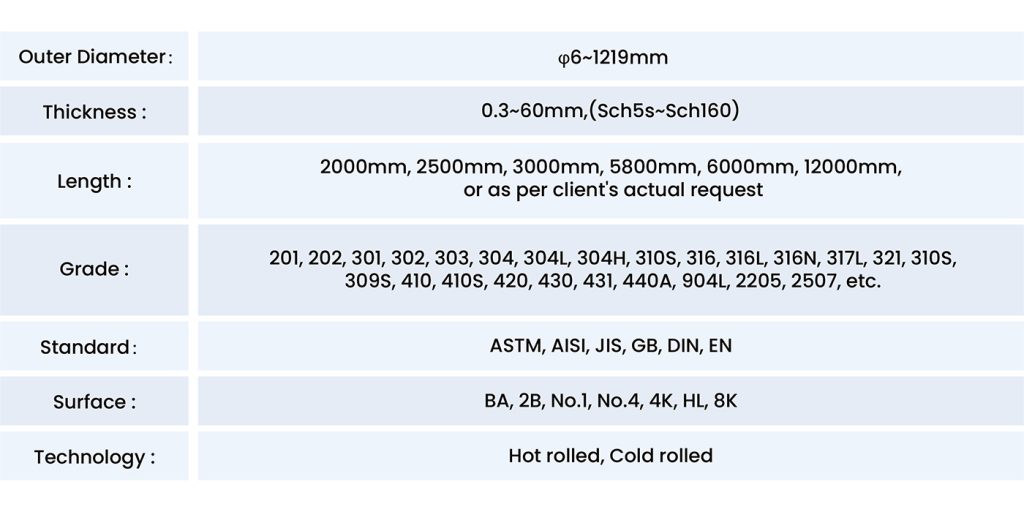Exploring the Fundamentals of Stainless Steel
Stainless steel is a remarkably versatile and extensively utilized material, renowned for its unique properties and numerous benefits. Its specific composition and attributes, along with its availability in various forms, render it an invaluable resource across diverse industries.
What Makes Stainless Steel Unique?
Composition and Properties
Stainless steel is an iron-based alloy with a high chromium content, typically at least 10.5%. This composition gives stainless steel its remarkable resistance to corrosion, making it suitable for a wide array of applications. Additionally, stainless steel is often alloyed with other elements such as nickel and molybdenum to enhance its corrosion resistance and aesthetic appeal.
Benefits Over Other Metals
Stainless steel is distinguished by its unique properties when compared to other metals. It offers superior durability, robust strength, and exceptional resistance to both high and low temperature extremes. Additionally, its excellent formability and ease of fabrication make it highly favored among manufacturers across diverse sectors. The material’s minimal maintenance needs, enduring quality, aesthetically pleasing finish, and eco-friendly attributes significantly enhance its widespread adoption in various applications.
Common Forms of Stainless Steel
Stainless Steel Plate
Stainless steel plate is a common form used in numerous industrial applications due to its durability and corrosion-resistant properties. It finds extensive use in the manufacturing of machinery components, structural elements, and equipment in diverse sectors.
Stainless Steel Pipe
The utilization of stainless steel tubing is prevalent in industries such as construction, oil & gas, and chemical processing due to its superior corrosion resistance. These forms of stainless steel are crucial for conveying fluids or gases in demanding environments where conventional materials may fail.
Stainless Metal Sheet
Stainless metal sheet is highly sought after for architectural purposes due to its aesthetic appeal and structural integrity. It serves as an essential material for cladding systems, roofing panels, decorative features, and interior design elements in modern construction projects.
Stainless Steel in the Medical Industry
Stainless steel plays a pivotal role in the medical industry. Its exceptional properties make it an indispensable material for ensuring hygiene, safety, and durability in medical settings.
Surgical Instruments and Implants
The utilization of stainless steel tubing is prevalent in the production of surgical instruments and implants due to its remarkable corrosion resistance, biocompatibility, and durability. These attributes are crucial for ensuring that medical devices remain sterile and free from contamination during surgical procedures. Furthermore, the high strength and formability of stainless steel allow for the fabrication of intricate surgical instruments with precision and reliability.
Stainless steel is highly valued in medical applications not only for its corrosion resistance but also for its biocompatibility, making it an exemplary choice for implants. The material’s capacity to assimilate harmoniously with biological tissues significantly reduces the likelihood of negative bodily responses. Furthermore, medical-grade stainless steel demonstrates enhanced resistance to corrosion and mechanical stress, as well as sustainability attributes. These properties make it a preferred material across a range of clinical uses.
Hospital Equipment and Sterilization
Stainless steel plays a pivotal role in enhancing hygiene and safety within medical settings, notably through its use in hospital equipment and sterilization processes. The material’s inherent corrosion-resistance properties render it ideal for the stringent hygienic demands of healthcare environments. Additionally, its capacity to minimize bacterial retention significantly underscores its utility in areas where cleanliness is critical.
Furthermore, the ease with which stainless steel can be cleaned and sterilized ensures that hospital apparatus remain devoid of contaminants. This attribute not only aids in upholding a sterile atmosphere but also extends the functional life of medical instruments and equipment. Consequently, stainless steel remains an indispensable asset in advancing hygiene standards throughout hospitals and other healthcare facilities.
Stainless Steel in Construction and Architecture
Stainless steel’s versatility and durability make it a preferred material for construction and architectural applications. Its corrosion resistance, aesthetic appeal, and environmental benefits have positioned it as a staple in modern urban infrastructure, building components, and architectural elements.
Building Structures with Stainless Steel
Stainless Steel Pipe in Construction
The use of stainless steel pipe in construction is widespread due to its exceptional corrosion resistance and durability. It is favored for structural applications where strength, reliability, and longevity are paramount. The material’s high-temperature tolerance, resistance to vibration fatigue, and chemical resistance further enhance its suitability for diverse construction projects. Additionally, stainless steel pipe offers design flexibility and ease of installation, making it an ideal choice for constructing robust building frameworks.
Aesthetic and Functional Uses in Architecture
Stainless Metal Sheet in Design
Stainless metal sheet serves as a versatile material for architectural design due to its pristine finish, malleability, and sustainability. It is extensively utilized in cladding systems, finishing components, roofing panels, and decorative features to enhance the visual appeal of modern structures. Moreover, stainless metal sheet fulfills stringent specifications for functionality, hygiene standards, and design flexibility in architectural applications.
Stainless steel’s role in architecture extends beyond aesthetics; it also contributes to the structural integrity of buildings by providing durable solutions that withstand environmental challenges while maintaining their visual allure.
The insights from industry experts further emphasize the significance of stainless steel in construction and architecture. Its corrosion resistance ensures long-term structural stability without compromising on aesthetic appeal or environmental sustainability. The material’s malleability allows architects to explore innovative designs while meeting functional requirements seamlessly.
Stainless Steel in the Food and Beverage Industry
Stainless steel is a cornerstone material in the food and beverage industry, offering unparalleled benefits for equipment, utensils, storage, and packaging. Its exceptional properties make it an indispensable asset in ensuring hygiene, safety, and preservation of consumable products.
Equipment and Utensils
Stainless steel plate play a pivotal role in food processing equipment and utensils due to their remarkable durability, corrosion resistance, and hygienic properties. The use of stainless steel ensures that food remains untainted by the material itself while also withstanding aggressive cleaning processes. This makes it an ideal choice for maintaining impeccable cleanliness in food preparation environments.
Moreover, stainless steel’s resistance to stains, odors, and flavors ensures that it does not alter the taste or quality of food products. Its robust corrosion resistance allows for seamless cleaning and sterilization without deterioration, making it the preferred material for ensuring food safety at every stage of production.
Storage and Packaging
The advantages of stainless steel in hygiene and preservation are evident in its widespread use for storage and packaging within the food and beverage industry. Stainless steel’s inherent resistance to corrosion enables it to maintain the integrity of stored products while upholding stringent hygiene standards.
The material’s ability to be cleaned and sterilized without degradation ensures that bacteria can be effectively removed from surfaces. This is crucial for preserving the quality of perishable goods throughout storage and transportation. Additionally, stainless steel does not impart any color or flavor to food products, making it an ideal choice for maintaining the purity of consumable items.
Furthermore, nickel-containing stainless steels have become a vital ingredient in the food supply chain due to their superior hygienic properties. They are widely utilized across various food-related industries, including food processing and catering, where hygiene standards are paramount for ensuring consumer safety.
Qingdao Sunrise New Material Co., Ltd. is an international and professional supplier of steel and non-ferrous metal raw material. Based in Qingdao, China, the company has invested and built production lines for products such as galvanized color coating, seamless steel pipes, cold-rolled plates, fiberglass, and stainless steel within China. The following is the parameter of Sunrise Stainless Pipes.
Conclusion
The Enduring Value of Stainless Steel
Stainless steel stands as a testament to enduring value, offering a myriad of benefits across diverse industries. Its remarkable properties, including corrosion resistance, durability, and aesthetic appeal, have solidified its position as an indispensable material in modern applications.
The International Stainless Steel Forum (ISSF) underscores the pivotal role of stainless steel in promoting environmental sustainability. It emphasizes the material’s recyclability and minimal environmental impact, aligning with global sustainability goals. Moreover, stainless steel‘s unique rolling processes contribute to its green credentials, further reinforcing its status as a sustainable material.
Stainless steel’s durability and minimal maintenance requirements eliminate the need for additional potentially hazardous materials, promoting sustainability. This inherent trait not only ensures longevity but also reduces the environmental footprint associated with frequent replacements or extensive maintenance procedures.
A Future Built on Stainless Steel
As industries continue to prioritize sustainable practices and environmentally friendly solutions, stainless steel emerges as a frontrunner in shaping the future landscape of manufacturing and construction. Its recyclability and minimal environmental impact position it as a cornerstone material for achieving long-term sustainability objectives.
The use of stainless steel products sourced from scrap materials exemplifies the circular economy model, contributing to reduced waste generation and resource conservation. This approach aligns with global efforts to minimize environmental degradation while fostering economic growth through responsible resource utilization.
Encouraging Sustainable Practices
Embracing stainless steel in various industrial sectors not only ensures operational efficiency but also fosters sustainable practices that benefit both businesses and the environment. By leveraging the recyclable nature of stainless steel and minimizing toxic run-off during production, industries can actively contribute to reducing their ecological footprint.
Furthermore, the continuous protection of stainless steel by a passive layer of chromium oxide underscores its status as a green material par excellence. This natural safeguard enhances its longevity while upholding stringent environmental standards, making it an ideal choice for sustainable development initiatives worldwide.
In conclusion, stainless steel’s enduring value lies not only in its exceptional properties but also in its capacity to drive sustainable practices across industries. As we look towards the future, embracing stainless steel is synonymous with embracing sustainability and responsible resource management.
By choosing stainless steel today, we pave the way for a greener tomorrow built on durable solutions that prioritize environmental well-being without compromising on performance or quality.









